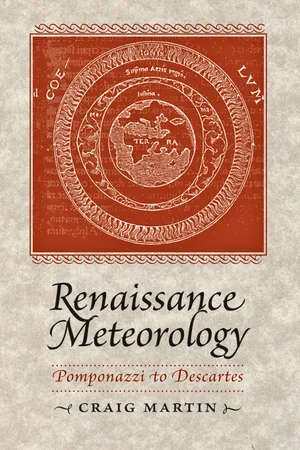
- English
- ePUB (mobile friendly)
- Available on iOS & Android
About this book
Craig Martin takes a careful look at how Renaissance scientists analyzed and interpreted rain, wind, and other natural phenomena like meteors and earthquakes and their impact on the great thinkers of the scientific revolution.
Martin argues that meteorology was crucial to the transformation that took place in science during the early modern period. By examining the conceptual foundations of the subject, Martin links Aristotelian meteorology with the new natural philosophies of the seventeenth century. He argues that because meteorology involved conjecture and observation and forced attention to material and efficient causation, it paralleled developments in the natural philosophies of Descartes and other key figures of the scientific revolution.
Although an inherently uncertain endeavor, forecasting the weather was an extremely useful component not just of scientific study, but also of politics, courtly life, and religious doctrine. Martin explores how natural philosophers of the time participated in political and religious controversies by debating the meanings, causes, and purposes of natural disasters and other weather phenomena.
Through careful readings of an impressive range of texts, Martin situates the history of meteorology within the larger context of Renaissance and early modern science. The first study on Renaissance theories of weather in five decades, Renaissance Meteorology offers a novel understanding of traditional natural philosophy and its impact on the development of modern science.
Frequently asked questions
- Essential is ideal for learners and professionals who enjoy exploring a wide range of subjects. Access the Essential Library with 800,000+ trusted titles and best-sellers across business, personal growth, and the humanities. Includes unlimited reading time and Standard Read Aloud voice.
- Complete: Perfect for advanced learners and researchers needing full, unrestricted access. Unlock 1.4M+ books across hundreds of subjects, including academic and specialized titles. The Complete Plan also includes advanced features like Premium Read Aloud and Research Assistant.
Please note we cannot support devices running on iOS 13 and Android 7 or earlier. Learn more about using the app.
Information
Table of contents
- Cover Page
- Title Page
- Copyright Page
- Contents
- Acknowledgments
- Introduction
- Chapter 1. The Epistemology of Meteorology
- Chapter 2. Teleology in Renaissance Meteorology
- Chapter 3. The Ferrarese Earthquakes and the Employment of Learned Meteorology
- Chapter 4. The Chymistry of Weather
- Chapter 5. Niccolò Cabeo’s Meteorology as the Basis for a New Aristotelianism
- Chapter 6. Causation and Method in Cartesian Meteorology
- Epilogue
- Notes
- Bibliography
- Index